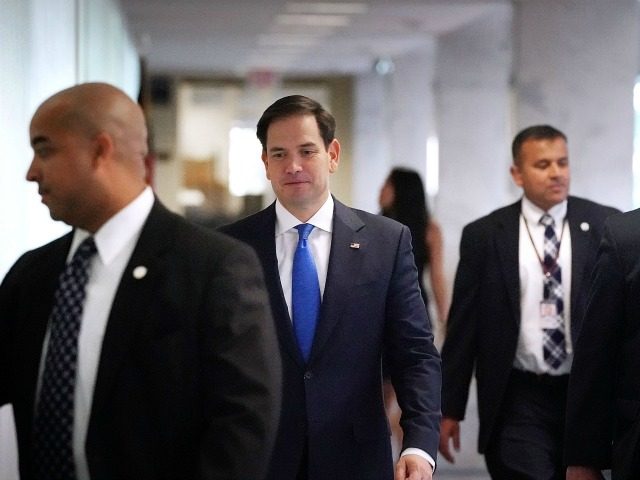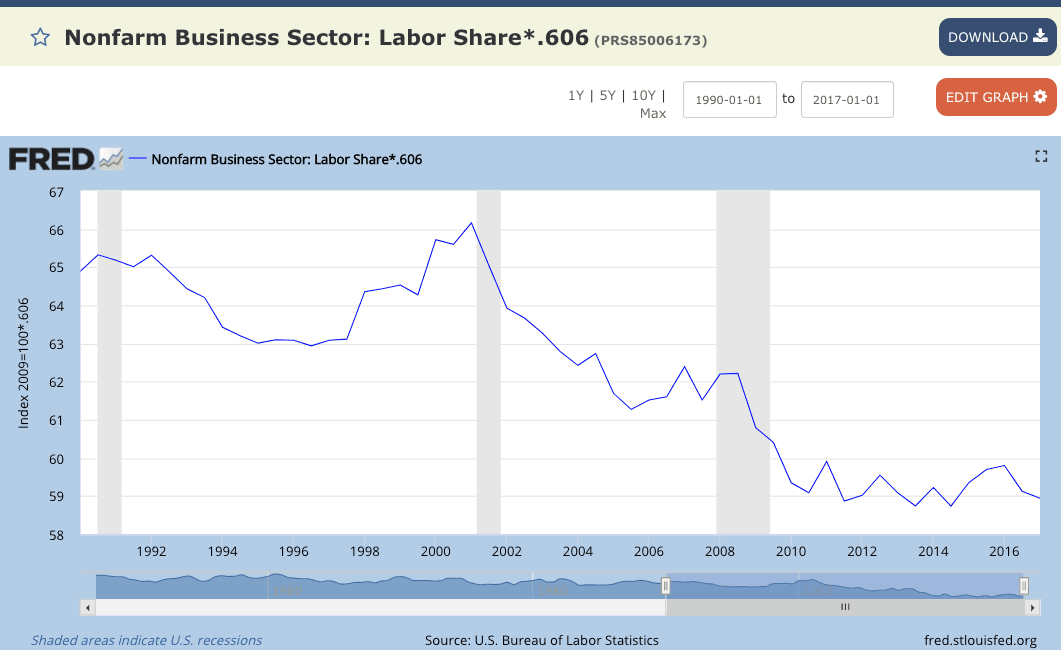Sen. Marco Rubio is signaling support for the centrist immigration plan developed by Senators Tom Cotton and David Perdue, which raise wages by ending chain migration, and which is backed by President Donald Trump.
The news was buried by Politico under a humdrum, passive-voice lede about the Florida Senator avoiding the very unpopular rush for wage-cutting amnesty led by a coalition of progressive Democrats and business-first Republicans. Politico led with:
Marco Rubio is done with gang life in the Senate.
The Florida GOP senator, a key co-author of the 2013 Gang of Eight comprehensive immigration bill, has no plans to join a swelling bipartisan group of senators trying to strike a deal to protect Dreamers
But Politico buried the real news from Rubio — whose career was very nearly destroyed in 2016 by his 2013 amnesty push — eight paragraphs into the article. It even relabels the chain migration of extended-family relatives as fake-news “family-based migration,” as if Rubio, Perdue, and Cotton would prevent Americans from bringing their spouses and minor children into the United States. Politico wrote:
Rubio has spoken in private GOP lunches enthusiastically about restricting family-based migration and indicated to Republicans he believes what can become law is something far more conservative than that bipartisan bill, according to GOP senators.
Three GOP senators said in interviews that the recently-reelected Rubio is privately aligning with a group of immigration hard-liners behind a bill that would cut some legal immigration and further limit refugees. Asked directly, Rubio did not specifically say he would back the measure by Sens. David Perdue (R-Ga.) and Sen. Tom Cotton (R-Ark.), but said “there’s a lot of concepts in that bill I could support.”
A recent poll showed that 79 percent of Americans oppose the chain migration rules.
Politico entombed additional news 20 paragraphs into the article:
Rubio keeps saying nice things about the bill written by Perdue and Cotton, a bill some Senate Democrats say is “nativist” for cutting immigration levels.
“Marco’s been very supportive of it,” Perdue said.
The Perdue/Cotton bill would raise Americans’ wages and productivity by ending the chain-migration of immigrants’ family relatives. That inflow roughly doubles annual legal immigration to 1.1 million, and it pressures employers to hire low-wage imported workers instead of hiring high-wage Americans to operate American-built, labor-saving machinery.
In contrast, the establishment’s so-called ‘dreamer’ amnesty — “a deal to protect Dreamers,” as Politico describes it — would flood the labor market with perhaps 8 million new workers, freezing the wage gains that Americans are now getting under Trump’s “Buy American, Hire Ameican” policies. The ‘dreamer’ amnesty would include no changes to the chain migration rules.
NumbersUSA, an immigration reform group, has long campaigned against the chain migration rules.
The Cotton/Perdue RAISE Act bill is at the center of Trump’s immigration policy.
Breitbart reported:
1. The Senate bill was jointly drafted by two GOP Senators who were elected in the 2014 wave. In that election, Senate Democrats lost ten seats because voters were angry at the Democratic-dominated “Gang of Eight” plan that would have doubled immigration for at least ten years, and shifted more of the nation’s annual income from employees to employers. The two Senators are Georgia CEO David Purdue, and Arkansas veteran and Harvard grad Tom Cotton
2. The plan would roughly halve the inflow of unskilled labor into the United States, so forcing employers to boost recruitment, training and pay for ordinary Americans. It would halve the inflow of unskilled by canceling the so-called “diversity lottery” which annually hands green cards to 50,000 people picked by lottery, by capping the inflow of refugees at 50,000 per year, and — most importantly — by largely ending the “chain migration” which allows new citizens to bring in their parents, adult children, and siblings, regardless of health, skills or ability to work.
3. Trump’s plan would allow companies to bring in highly skilled or “ultra-skilled” foreigners — if those foreigners can prove their skills by showing job offers which pay MORE than what is being paid to local Americans. That merit-based process would put an upward ratchet on Americans’ wages, instead of the current process which drags down wages by flooding the labor market with unskilled workers.
4. Most applicants for immigration and citizenship would be graded on a points system, determined by their age, education credentials, English-language skills, professional awards, investment resources, and job offers. That process likely will allow the immigration of highly skilled foreigners who want to assimilate into Americans’ democratic culture — and who can also develop new technology that makes Americans more productive and wealthy.
5. Progressives want to hate the reform. It would end their plan to seize national power via the mass immigration of unskilled, government-dependent migrants. That plan has already won them near-complete power in California and Illinois. But without those future migrants, progressives would be forced to seek the votes from actual blue-collar and white-collar Americans, so shifting the focus of national politics back towards a focus on middle-class Americans, and away from the progressives’ media-magnified push for pro-transgender laws, free abortion and weather control.
6. Business and investors rationally hate the merit-based plan. It would reduce the inflow of cheap labor and of welfare-funded consumers which have helped boost profits and the stock market. Without those migrants, companies will have to raise wages for employees, recruit and train now-sidelined Americans, and invest in American-made, labor-saving machinery, such as robots for farms, restaurants, and slaughterhouses.
7. Prior polls suggest Trump’s plan will be very popular because it prioritizes Americans over foreigners, employees over employers, wages over profits, and solidarity around the English language over imposed multiculturalism. But the media polls will try to suppress that Trump advantage by portraying the pro-American plan as being mean to weak foreigners, so allowing many elected officials to ignore the public’s real views until around September 2018. That is when the Americans will have the decisive opportunity to vote for or against politicians who support or oppose Trump’s reform. To read more about immigration polls, click here.
Four million Americans turn 18 each year and begin looking for good jobs in the free market.
But the federal government inflates the supply of new labor by annually accepting roughly 1.1 million new legal immigrants, by providing work-permits to roughly 3 million resident foreigners, and by doing little to block the employment of roughly 8 million illegal immigrants.
The Washington-imposed economic policy of economic growth via mass-immigration floods the market with foreign labor, spikes profits and Wall Street values by cutting salaries for manual and skilled labor offered by blue-collar and white-collar employees. It also drives up real estate prices, widens wealth-gaps, reduces high-tech investment, increases state and local tax burdens, hurts kids’ schools and college education, pushes Americans away from high-tech careers, and sidelines at least 5 million marginalized Americans and their families, including many who are now struggling with opioid addictions.
The cheap-labor policy has also reduced investment and job creation in many interior states because the coastal cities have a surplus of imported labor. For example, almost 27 percent of zip codes in Missouri had fewer jobs or businesses in 2015 than in 2000, according to a new report by the Economic Innovation Group. In Kansas, almost 29 percent of zip codes had fewer jobs and businesses in 2015 compared to 2000, which was a two-decade period of massive cheap-labor immigration.
Because of the successful cheap-labor strategy, wages for men have remained flat since 1973, and a large percentage of the nation’s annual income has shifted to investors and away from employees.



COMMENTS
Please let us know if you're having issues with commenting.